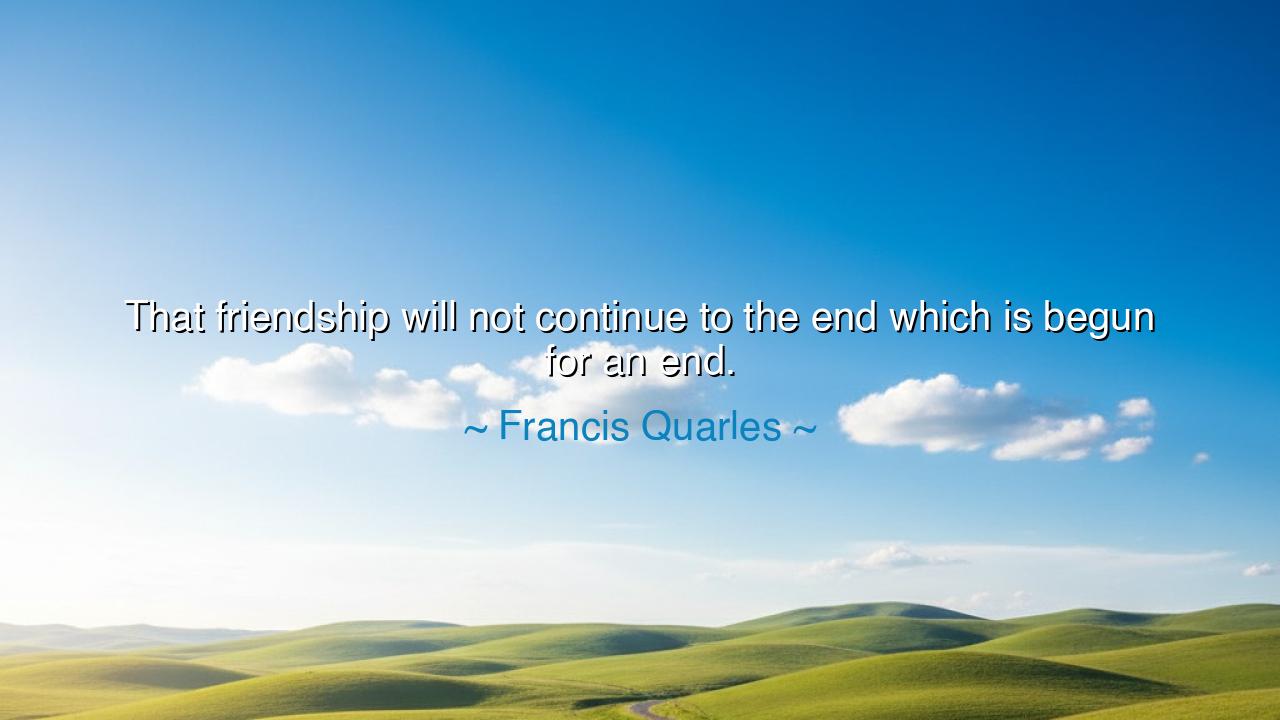
That friendship will not continue to the end which is begun for






The words, “That friendship will not continue to the end which is begun for an end,” come from the pen of Francis Quarles, the seventeenth-century English poet whose writings were steeped in faith, morality, and divine contemplation. In these few, solemn words, Quarles unveils a truth older than stone and deeper than time—that a friendship born from selfish purpose cannot endure, for what begins in deceit or gain will perish when the profit is spent. A bond that is forged not in affection, but in ambition, is no bond at all—it is a transaction, clothed in the disguise of companionship.
In the spirit of the ancients, we may say that friendship is a sacred fire, meant to warm, not to burn; to enlighten, not to consume. When a man befriends another for advantage—be it wealth, position, or favor—his affection is but a shadow, cast by the flickering light of desire. Such a bond, though it may shine for a moment, will fade when the light is gone. The heart that seeks friendship for its own sake is like a spring that flows of its own accord; but the heart that seeks friendship for gain is like a well drawn by ropes—it gives only until the rope frays and the bucket breaks.
Look to the story of Julius Caesar and Pompey, those mighty men of Rome who once clasped hands in alliance, each seeing in the other not a friend, but a ladder to ascend the heights of power. Their friendship began for an end—for ambition, not affection—and so, when the summit was reached, the bond unraveled. The friendship that had served a purpose could not survive without it, and the brothers of politics became the enemies of war. Thus, history bears witness to Quarles’s wisdom: that no companionship founded upon utility can withstand the test of time, for when the reason for union dies, so too does the affection that was never real.
True friendship, the ancients tell us, is selfless and pure, unmeasured by gain and uncorrupted by convenience. It is a bond of souls, not of schemes—a covenant of trust, not of trade. When two hearts meet in sincerity, neither seeking advantage, both offering goodwill, that friendship becomes as enduring as the mountains. But when it is born of greed or vanity, it is doomed to crumble like a house built upon sand. For what is sought for an “end” must end when that purpose is fulfilled; only what is sought for love’s own sake can live without condition.
Quarles, a man of faith, wrote in an age when loyalty was often bought and friendship was a coin of courtly exchange. His warning echoes across centuries: beware the friend whose smile depends upon your fortune, for when your sun sets, their warmth will fade. The wise man, therefore, looks not to the flattering tongue or the open hand, but to the steadfast heart—the one who stands beside him when the world has turned its face away. For such a friend is the mirror of divine love, which gives expecting nothing in return, and remains even when all else is lost.
To live by this wisdom, one must choose friends by virtue, not by usefulness. Seek those whose companionship brings truth, not gain; those who correct your faults, not those who conceal them for their benefit. Give friendship as you would give light—freely, expecting nothing, and yet illuminating all who come near. Do not let your affection be a chain that binds another to your will, but a bridge that connects heart to heart. The friendships that last are those built on respect, on honesty, and on the quiet joy of shared goodness.
And so, remember this, my child: a friendship that serves a purpose will perish with it, but one that serves the soul will endure beyond death itself. Love your friends not for what they can do, but for who they are. Be the kind of friend whose presence is a comfort, not a convenience. For when the years grow old and fortune fades, it is not the powerful or the useful who will remain—it is the one who cared without motive, who loved without cause, who stood beside you not for an end, but for eternity.
Thus, as Francis Quarles teaches, let your friendships be as the stars—shining not for what they gain, but simply because it is their nature to give light. Such is the friendship that endures to the end, and beyond.






AAdministratorAdministrator
Welcome, honored guests. Please leave a comment, we will respond soon